a&e features
The business of performing at Pride
Show me the money: Crowds expect big names but most events are non-profits
Icona Pop perform at the 2013 Capital Pride Festival. (Washington Blade file photo by Tyler Grigsby)
When asked why she made Pittsburgh the site of her first Pride appearance in 2012 as opposed to a trendier city, out rocker Melissa Etheridge was matter of fact: “Pittsburgh showed me the money,” she told the crowd to a huge round of applause.
In retrospect, though, it wasn’t the stretch it might have seemed at first glance. Despite her industry cred as a Grammy-winning soul rocker with enough pop sensibility to have secured an impressive run of radio hits in the ‘90s, Etheridge has always projected a rootsy, blue-collar vibe much the same way Bruce Springsteen and John Mellencamp have straddled the heartland/A-lister fence for decades on end. And yet, for Pittsburgh Pride, it was a huge moment.
“She really was up there just preaching and having fun,” says Gary Van Horn, president of the board of the Delta Foundation of Pittsburgh, the agency that produces Pittsburgh Pride. “She used the pulpit and she was speaking to her people.”
Van Horn says Etheridge was contracted to do a 75-minute set but ended up playing for about two-and-a-half hours. And although details of her contract are protected, as is the industry norm, by a confidentiality clause, Van Horn says he didn’t find her fee outrageous considering she travels with 11 people counting band members and manager, whose travel and hotel expenses have to be paid. After deciding in 2006 to move Pittsburgh Pride downtown and have a big-name headliner give a full concert-length set for which patrons would have to purchase tickets, Van Horn says he and his team couldn’t have been more pleased with Etheridge’s set.
“At the end of the day, I would be very, very shocked if she cleared more than thousands of dollars just knowing she had to pay everybody,” he says. “There is a thought process out there that they should be doing this for free since it’s a non-profit Pride event, but this is their job. This is how they pay their bills, they go and perform. Obviously it’s important to do charity work sometimes, but there are over 120 Pride events in the U.S. that I know of and we’re only talking about a handful of artists that are even remotely available to that group and the same handful of folks at every Pride organization wants them, so to just expect them to do it for free is just not feasible. We showed her the money because she needed to have that.”
The behind-the-scenes business of bringing celebrity entertainers in to perform at Pride events — historically seen as a stage for either up-and-comers or past-their-prime acts that haven’t had hits in years but to whom gay men have been traditionally loyal — is a dicey discussion. Obviously everybody wants to dream big and hope for a legend, but there are many factors involved: tour schedules, riders, appearance fees, whether the show is free or requires a ticket and more. Because the Capital Pride Festival is a free event, few would expect somebody of Beyonce’s caliber would be willing to give a free two-hour show. That hasn’t, however, stopped organizers — many of whom, like Van Horn, are volunteers — from exploring how many branches up the higher-hanging fruit sits.
“Of course I would always aim high and then get shot back down,” says Steve Henderson, a Capital Pride volunteer who worked for 17 years (his last year was 2013) on the entertainment planning committee. “Unless they were going for a pro bono show, we would never be able to get a Gaga, Britney or Madonna-like act. Not while it’s a free festival. Gaga is a minimum $1 million plus more riders than Pride could ever handle. She also required a 10-truck load in and performance rehearsals weeks in advance, which we cannot do since the stage is installed the evening of the festival. That has been the problem with the ‘A grade’ headliners.”
Henderson says he worked for years on a shoestring budget of about $15,000-20,000 at most for the day, a figure that had to include traveling expenses, lodging and everything. As you might imagine, most of the entertainers who play throughout the day on the Capital Pride main stage — the Gay Men’s Chorus, the drag cast at Ziegfeld’s, emcees such as Destiny Childs, etc. — donate their time. Corporate sponsorships and partnerships have given current organizers bigger budgets, he says. Ryan Bos, Capital Pride executive director, says he’s not allowed to disclose the budget for headliners.
Despite the challenges, Henderson, who now lives in Chicago, has many good memories and says he’s proud of the many acts they brought in over the years — RuPaul in 2009, Chely Wright in 2010, Deborah Cox in 2012 and Cher Lloyd, Emeli Sande and Icona Pop in 2013 and more.
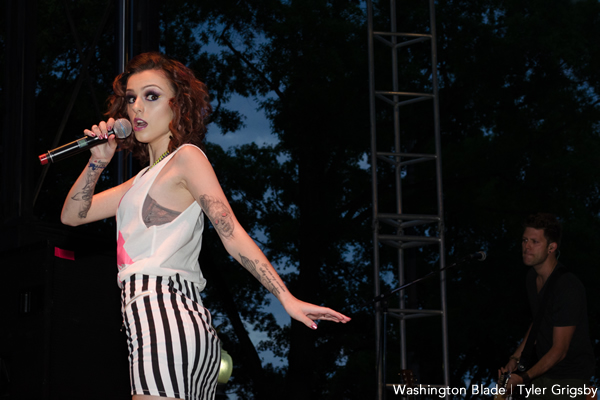
Cher Lloyd performs at the 2013 Capital Pride Festival. (Washington Blade file photo by Tyler Grigsby)
He says only two acts ever cancelled — Mya gave about three weeks’ notice citing a skiing accident in 2010. Chely Wright had just come out and was happy to fill in. The biggest nail biter, Henderson says, was Kelly Rowland’s 2011 cancellation about a week before the event. His years of working as a DJ with various record labels was always a help, but especially then, he says. Broadway belter Jennifer Holliday, who’d just sung with the Gay Men’s Chorus of Washington the week before, saved the day.
“I didn’t really have time to freak out, I just had to figure out who we were gonna get,” Henderson says. “Thankfully I knew Jennifer from past work and I literally called her within a minute of it happening. She was somebody we had discussed about being a headliner or a co-headliner but we didn’t have the budget to do both. We had landed Kelly, which was pretty huge since her song was so big at the time, we really felt we had a winner.”
Henderson says her camp gave no reason for the abrupt cancellation.
“It was just a real quick e-mail. ‘Sorry, not-gonna-be-able-to-make-it’-type thing. No reason.”
Bos says three years ago the team that now plans main stage entertainment opted for a different approach and now bring in three co-headliners who each perform 25-35-minute sets to give the event more of a festival concert-type feel.
“We did it to diversify, to set ourselves apart a little and to not throw all the eggs in one basket,” he says.
This year’s concert, co-presented with radio station Hot 99.5, will feature En Vogue, Wilson Phillips, Amber and Carly Rae Jepsen. He says ‘90s acts like the former two were purposefully chosen to dovetail with this year’s Flashback theme as it’s the 40th anniversary of Capital Pride. Last year’s lineup was Karmin, Bonnie McKee, DJ Cassidy and Betty Who.
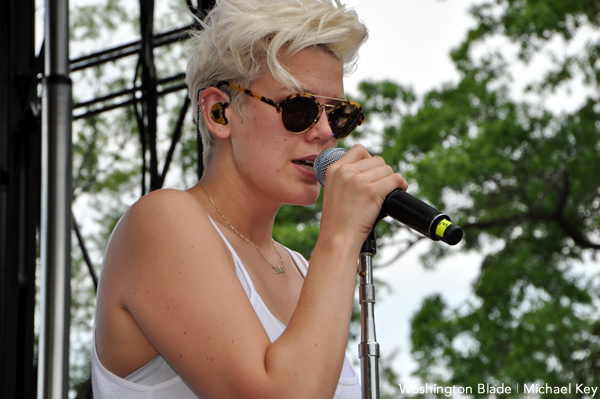
Betty Who performs at the 2014 Capital Pride Festival. (Washington Blade file photo by Michael Key)
And while there will always be a spot for yesterday’s hit makers at various Pride events — one recalls Inaya Day (“Nasty Girl”) who played Capital Pride in 2010 or Taylor Dayne (“Tell it to My Heart”) who’s found new life headlining Prides all over the Eastern Seaboard — Bos says the notion that Pride is a place for washed-up divas of yesteryear is an anachronism.
“I think that’s an old perception,” he says. “For artists who are trying to launch an album, Pride provides an opportunity to get in front of a huge community. For those who have been around a while, they know the support from the gay community so they see it as a way to give back, but that perception has been shifting for a while now and you see it at other Prides as well.”
Michael Musto, gay author and Musto! the Musical! columnist at out.com, agrees.
“It used to be unfairly thought of as a dubious career move to do Pride-related events, but as LGBT became more accepted, so did Pride,” he told the Blade. “Once big names started performing at the Pier dance after the parade here in New York City (for big money of course), there was no stigma at all. They can also work the parade itself or do any number of things around the country for Pride and it’s considered a good move for all involved.”
Van Horn says the caliber of talent at Pittsburgh Pride started an uptick after they brought in Tiffany in 2006 and Kimberley Locke in 2007. In recent years, besides Etheridge, they’ve brought in top acts like Adam Lambert and Patti LaBelle. This year’s headliner is Iggy Azalea.
He says overall the community understands and established acts like Etheridge and LaBelle bring in their own fan bases, people who ordinarily wouldn’t attend Pride.
“Of course, yeah, everybody wants Cher or Cyndi Lauper or J. Lo or Beyonce but they have to be realistic,” Van Horn says. “They’re in high demand and they get paid a lot. We have a list that continually gets updated via committee and we get suggestions from the community and then we start putting feelers out there with agents and management companies.”
He also says there are a bounty of expenses involved in bringing in household names that the general public would never think of such as the logistics of building a downtown stage for a one-off, lights, power, security, portable toilets, fencing, clean-up services — all in addition to the event itself. The Delta Foundation has one paid staff member and a host of volunteers.
“You’re a victim of your own success in a way,” he says. “You continue to attract more and more people and yet it’s also up to you to make sure they’re all safe and provided for as well. Our Sunday event attracts about 90,000 people so you have to make sure they’re all safe, have food to eat and drink throughout the day, the tents, tables and chairs — you have to provide all that.”
So what’s it like from the other side? Are there any unwritten industry rules for playing Pride events among artists and managers?
Howard Bragman, a gay PR veteran of Fifteen Minutes who’s worked with many LGBT acts, says not really. Several acts in his stable will be at various Prides this year including Chaz Bono who will appear at Toronto Pride with Lauper and Pussy Riot, and Ty Herndon who’s slated for Chicago Pride.
“I think it depends on the person and the moment,” Bragman says. “Somebody ends up in the news and comes out and suddenly all the Prides come after you. It’s a great honor. Even when they have to say no, it’s a great honor because you’re representing a community. … Nobody is offended. It’s a totally flattering moment.”
He says in New York and Los Angeles, where celebrities often live, it’s not uncommon for them to donate their time but if travel is involved, most Pride organizers know they’ll have to pay.
“It just depends,” he says. “But inevitably, yeah, it’s a family rate, it’s not their top-dollar corporate rate and for these people who have speaking engagements, generally it’s not just come in and ride in the parade for two hours. You come in the Friday before, there’s a reception, there are many interviews, sometimes on Saturday you cut the ribbon at the festival and then there’s the parade on Sunday. It’s a lot of work, but the best ones are the ones that are well organized and have been doing it a long time. Those are the ones they’re the happiest to do.”
Van Horn says it’s practically impossible to gauge how close Pride fees jell with rates the same artist would require for a regular appearance. Pride sets are typically much shorter than a normal show.
“There isn’t much data available on how much people pay for an artist because it’s all confidential,” he says. “Like at New York City Pride when Cher came out and sang four songs (in 2013), I know what Cher gets paid and I know New York City Pride wasn’t paying her typical fee.”
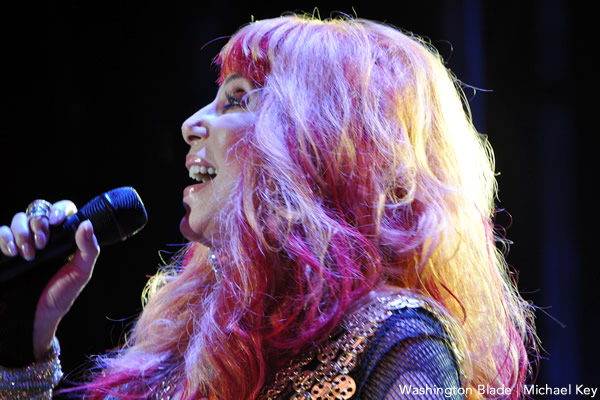
Cher performs at New York Pride’s ‘Dance on the Pier’ in 2013. (Washington Blade file photo by Michael Key)
Out singer-songwriter Eric Himan has played many Pride events since his first in South Florida in 2002. Now based in Tulsa, Okla., happily married and promoting his new album “Playing Cards,” he says Pride events have changed radically over the last decade or so.
“The thing about Pride is that Pride means something different to everybody and so every organizer has a different approach,” he says. “For some, it’s a rally. For others, it’s a day to get away from politics and just enjoy being out. The trajectory of how much Pride has changed from being something in the park that only gay people go to, to moving downtown and incorporating a lot of businesses and corporate sponsorships so it’s not just the gay bars sponsoring it, I’ve definitely noticed that change. So when you go in, you have to find out from the organizer what their idea of Pride is. I always viewed it as an opportunity to go be in my community and voice my ideas and concerns about how gay people fit into the world however you might go and everybody just wants a big dance party so you have to think about how you’re going to fit into that as the acoustic, live musician.”
He says there have been times the mid-tier musicians get shafted when various Pride committees spend the bulk of their budget to bring in a name act.
“Sometimes I’m glad to donate things, like CDs for a raffle or something like that,” he says. “My only concern is when I find out, ‘Oh hey, we just spent 80 grand on yada yada but will you play for free?,’ that’s kind of when I’m like, ‘That doesn’t seem correct.’ … When you go spend all your money on one person you wanted to bring, that’s when I get nervous about being a part of it.”
Playing for the exposure is a common bone some organizers toss, he says.
“Sometimes that’s OK but exposure is something you can’t really promise. What if it gets rained out that day? Well, there goes your exposure. Or what if the main act is at 12 that night, but they stick you on a stage next to it at 11 a.m.? Early on when you’re starting out as a musician, you don’t play for much money so the exposure works, but I’ve always found the times I’ve really gotten the best exposure have always been at paid gigs. I can’t recall one gig where they promised exposure and it was like, ‘Oh god, it worked out.’”
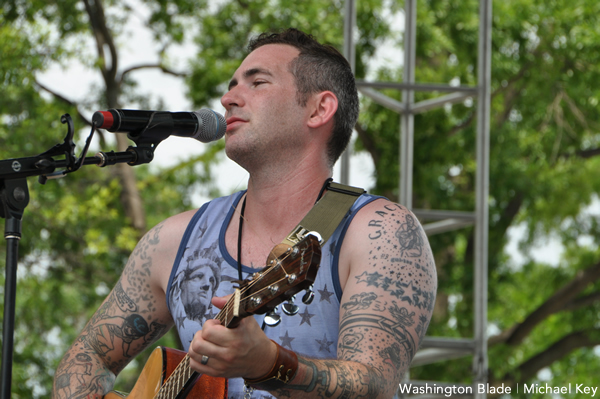
Eric Himan performs at the Capital Pride Festival in 2013. (Washington Blade file photo by Michael Key)
Henderson gets that but says over his 17-year tenure at Capital Pride, he guesses 70-80 percent of the acts, especially the community groups, donated their time.
“I had long-running relationships with a lot of these labels, so I was able to negotiate a lot of pro bono stuff,” he says. “Icona Pop was pro bono. So was Consuelo Costin and obviously all the local people like the Gay Men’s Chorus, the D.C. Cowboys and all the local favorites. They all came in to donate their time and production and give up half of their afternoon on a steaming hot Sunday.”
He also says the role of the Pride entertainment committee volunteer chair is a thankless job. He got involved as a “way to give back” but says it can easily ramp up into a second full-time job in the months leading up to Pride. He also says working by committee has a downside as well.
“We lost out on some really big ones over the years waiting for the board to make a decision,” Henderson says. “I wasn’t the one making the final decision and a couple times they waited too long and we lost out. Foster the People, Imagine Dragons and Diana Ross to name a few.”
Van Horn says all the artists he’s worked with have been easy and he has “no horror stories.”
“They always have safety and security concerns but that’s understandable,” he says. “There are crazies in the world. But no, there have never been any requests for M&Ms but take out all the blue ones or anything like that.”
Henderson says the hardest part of the job was always keeping things running smoothly backstage where there are only three cooled dressing room/trailers. Making sure they’re clean and free for who needs them at any given time is tough, he says.
“There’s always something going on like (local drag legend) Ella (Fitzgerald) shows up early and there’s no dressing room ready so her whole face melts off in the 100-degree heat,” he says with a laugh. “Getting the headliners from the hotel to the backstage area to making sure they had a dressing room ready and clean especially when you have 40-50 entertainers throughout the day, those logistics were always the hardest part.”
But on the occasions where it worked, there were magical moments. Henderson says when Pepper MaShay sang the “Dive in the Pool” song from “Queer as Folk” at the 2012 event with its famous line “Let’s get soaking wet,” the fire department’s decision to spray the crowd was not planned.
“It was probably 105 degrees that day and they were there to have some water stations so people could cool off because it was just so hot,” he says. “Ironically they had put this big main hose on a ladder truck maybe about 10 minutes before Pepper went on so we ran over to the fire chief and said it would be kind of neat if you could spray the crowd when she sang that line. When it happened, everybody thought it was pre-planned but we just decided that minutes before. People were dancing and going crazy. It was fantastic.”
Bragman says he always encourages his celebrity clients to do Prides anytime they can and says the payoff isn’t always in dollars.
“Pride is always a big deal,” he says. “It’s really powerful. I always say go with the right attitude, go and have fun and you will be changed. You always go home with so much more than you gave, that’s just the nature of the beast. It’s such an emotional high.”

Chely Wright performs at the Capital Pride Festival in 2010. (Washington Blade file photo by Michael Key)
a&e features
Queer highlights of the 2026 Critics Choice Awards: Aunt Gladys, that ‘Heated Rivalry’ shoutout and more
Amy Madigan’s win in the supporting actress category puts her in serious contention to win the Oscar for ‘Weapons’
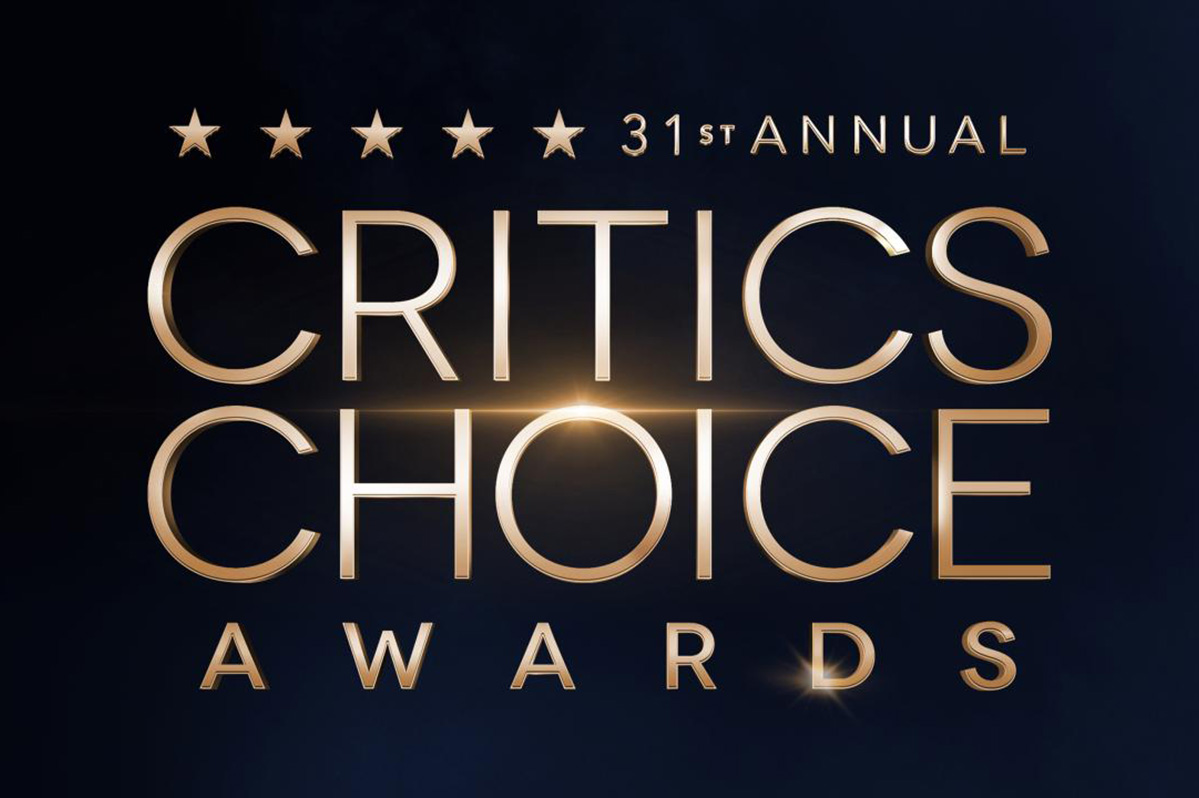
From Chelsea Handler shouting out Heated Rivalry in her opening monologue to Amy Madigan proving that horror performances can (and should) be taken seriously, the Critics Choice Awards provided plenty of iconic moments for queer movie fans to celebrate on the long road to Oscar night.
Handler kicked off the ceremony by recapping the biggest moments in pop culture last year, from Wicked: For Good to Sinners. She also made room to joke about the surprise hit TV sensation on everyone’s minds: “Shoutout to Heated Rivalry. Everyone loves it! Gay men love it, women love it, straight men who say they aren’t gay but work out at Equinox love it!”
The back-to-back wins for Jacob Elordi in Frankenstein and Amy Madigan in Weapons are notable, given the horror bias that awards voters typically have. Aunt Gladys instantly became a pop culture phenomenon within the LGBTQ+ community when Zach Cregger’s hit horror comedy released in August, but the thought that Madigan could be a serious awards contender for such a fun, out-there performance seemed improbable to most months ago. Now, considering the sheer amount of critics’ attention she’s received over the past month, there’s no denying she’s in the running for the Oscar.
“I really wasn’t expecting all of this because I thought people would like the movie, and I thought people would dig Gladys, but you love Gladys! I mean, it’s crazy,” Madigan said during her acceptance speech. “I get [sent] makeup tutorials and paintings. I even got one weird thing about how she’s a sex icon also, which I didn’t go too deep into that one.”
Over on the TV side, Rhea Seehorn won in the incredibly competitive best actress in a drama series category for her acclaimed performance as Carol in Pluribus, beating out the likes of Emmy winner Britt Lower for Severance, Carrie Coon for The White Lotus, and Bella Ramsey for The Last of Us. Pluribus, which was created by Breaking Bad’s showrunner Vince Gilligan, has been celebrated by audiences for its rich exploration of queer trauma and conversion therapy.
Jean Smart was Hack’s only win of the night, as Hannah Einbinder couldn’t repeat her Emmy victory in the supporting actress in a comedy series category against Janelle James, who nabbed a trophy for Abbott Elementary. Hacks lost the best comedy series award to The Studio, as it did at the Emmys in September. And in the limited series category, Erin Doherty repeated her Emmy success in supporting actress, joining in yet another Adolescence awards sweep.
As Oscar fans speculate on what these Critics Choice wins mean for future ceremonies, we have next week’s Golden Globes ceremony to look forward to on Jan. 11.
a&e features
Looking back at the 10 biggest A&E stories of 2025
‘Wicked,’ Lady Gaga’s new era, ‘Sexy’ Bailey and more
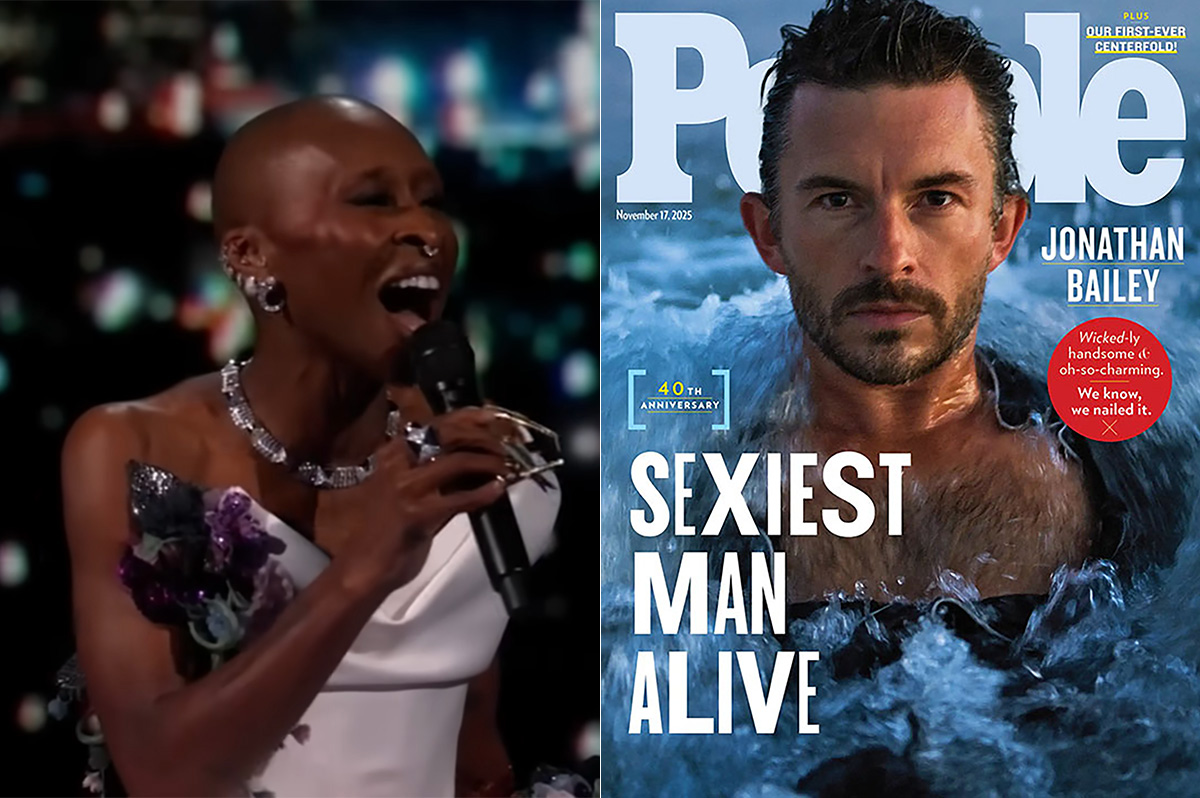
Although 2025 was a year marked by countless attacks on trans rights and political setbacks, the year also saw brilliant queer artists continuing to create art. From Cannes and Sundance Award winners now vying for Oscar consideration to pop icons entering new stages of their careers, queer people persevered to tell their stories through different media.
With the state of the world so uncertain, perhaps there’s no more vital time to celebrate our wins, as seen through some of this year’s top pop culture moments. While there’s no collection of 10 stories that fully encompass “the most important” news, here are some events that got the gays going:
10. ‘Mysterious Gaze of the Flamingo’ wins big at Cannes
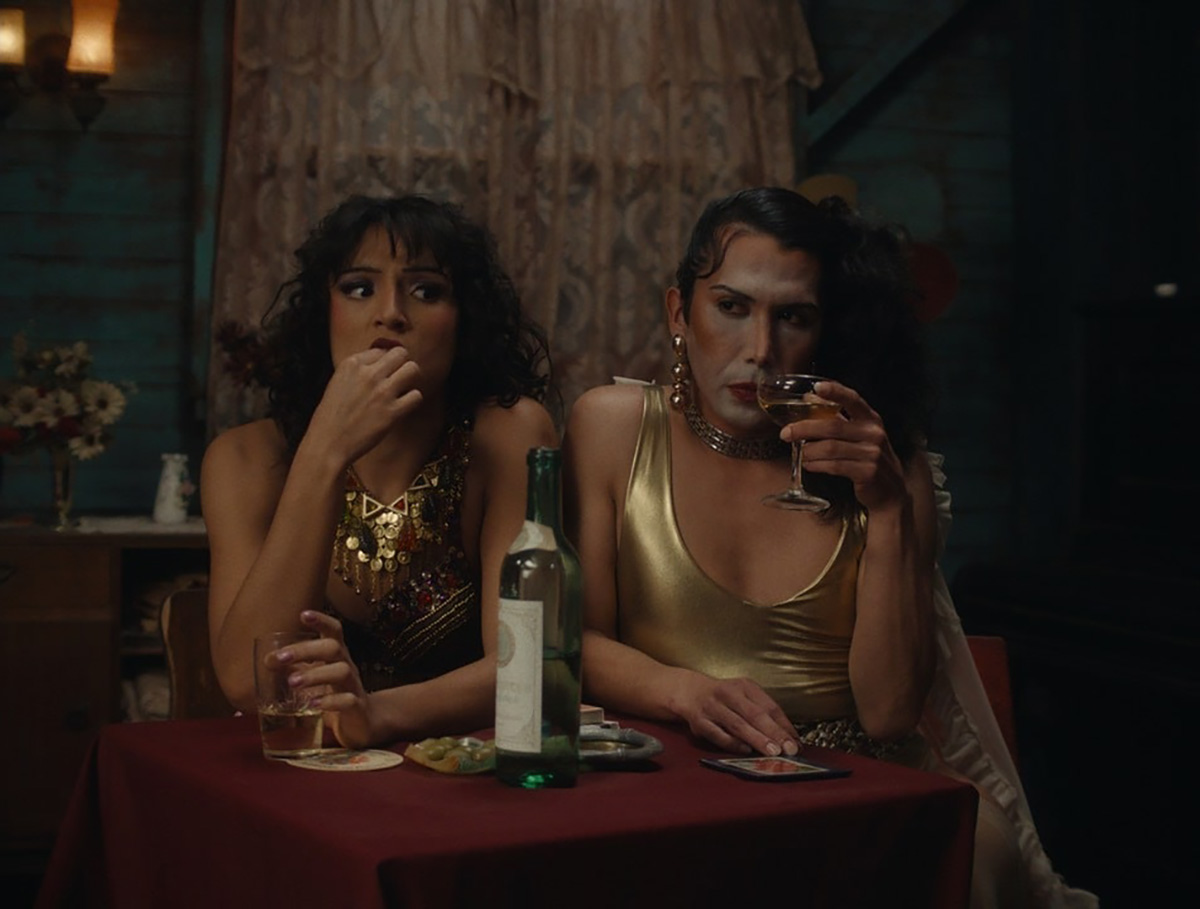
The Cannes Film Festival has become a crucial start for films hoping to make their way to the Oscars, and first-time director Diego Céspedes won the top Un Certain Regard prize for his intimate western “The Mysterious Gaze of the Flamingo.” The film is set in the ‘80s and is intended as an allegory for the AIDS epidemic. Seeing a film that unpacks vital queer history win one of the most coveted awards at Cannes has been a huge point of pride in the independent filmmaking community.
Since the film bowed at Cannes, it has been selected as Chile’s Oscar entry in the Best International Feature race. Speaking with The Blade during the film’s AFI Fest run in October, Céspedes said: At first, I was kind of scared to have this campaign position in the times that we’re living [in] here. But at the same time, I think the Oscars mean a huge platform — a huge platform for art and politics.”
9. ‘The Last of Us’ returns for an even gayer season 2
While the first season of The Last of Us gave us one of TV’s most heartbreaking queer love stories in the episode “Long, Long Time,” Season 2 doubled down on its commitment to queer storytelling with the blossoming relationship between Ellie (Bella Ramsey) and Dina (Isabela Merced). The show expanded on the pair’s relationship in the original video game, making it perhaps the central dynamic to the entire season. That unfortunately came with more homophobic backlash on the internet, but those who checked out all the episodes saw a tender relationship form amid the show’s post-apocalyptic, often violent backdrop. For their performance, Ramsey was once again nominated for an Emmy, but Merced deserved just as much awards attention.
8. ‘Emilia Pérez’ sparks controversy
Jacques Audiard’s genre-bending trans musical “Emilia Pérez” proved to be an awards season juggernaut this time last year, winning the Golden Globe for Best Musical/Comedy. But when the lead star Karla Sofia Gascón’s racist, sexist, and homophobic old tweets resurfaced, the film’s Oscar campaign became a tough sell, especially after Netflix had tried so hard to sell Emilia Pérez as the “progressive” film to vote for. Mind you, the film had already received significant backlash from LGBTQ+ audiences and the Mexican community for its stereotypical and reductive portrayals, but the Gascón controversy made what was originally just social media backlash impossible to ignore. The only person who seemed to come out of the whole debacle unscathed was Zoe Saldaña, who won the Oscar for Best Supporting Actress over Ariana Grande.
7. ‘Sorry, Baby’ establishes Eva Victor as major talent
Back in January at the Sundance Film Festival, Eva Victor (known by many for her brand of sketch comedy) premiered their directorial debut “Sorry, Baby” to rave reviews, even winning the Waldo Salt Screening Award. Victor shadowed Jane Schoenbrun on the set of “I Saw the TV Glow,” and seeing Victor come into their own and establish such a strong voice immediately made them one of independent cinema’s most exciting new voices. A memorable scene in the film sees the main character, Agnes (played by Victor), struggling to check a box for male or female, just one example of how naturally queerness is woven into the fabric of the story.
Most recently, Victor was nominated for a Golden Globe for her performance in the film, and she’s represented in a category alongside Jennifer Lawrence (“Die My Love”), Jessie Buckley (“Hamnet”), Julia Roberts (“After the Hunt”), Renate Reinsve (“Sentimental Value”) and Tessa Thompson (“Hedda”). The film also received four Independent Spirit Award nominations overall.
6. Paul Reubens comes out in posthumous doc
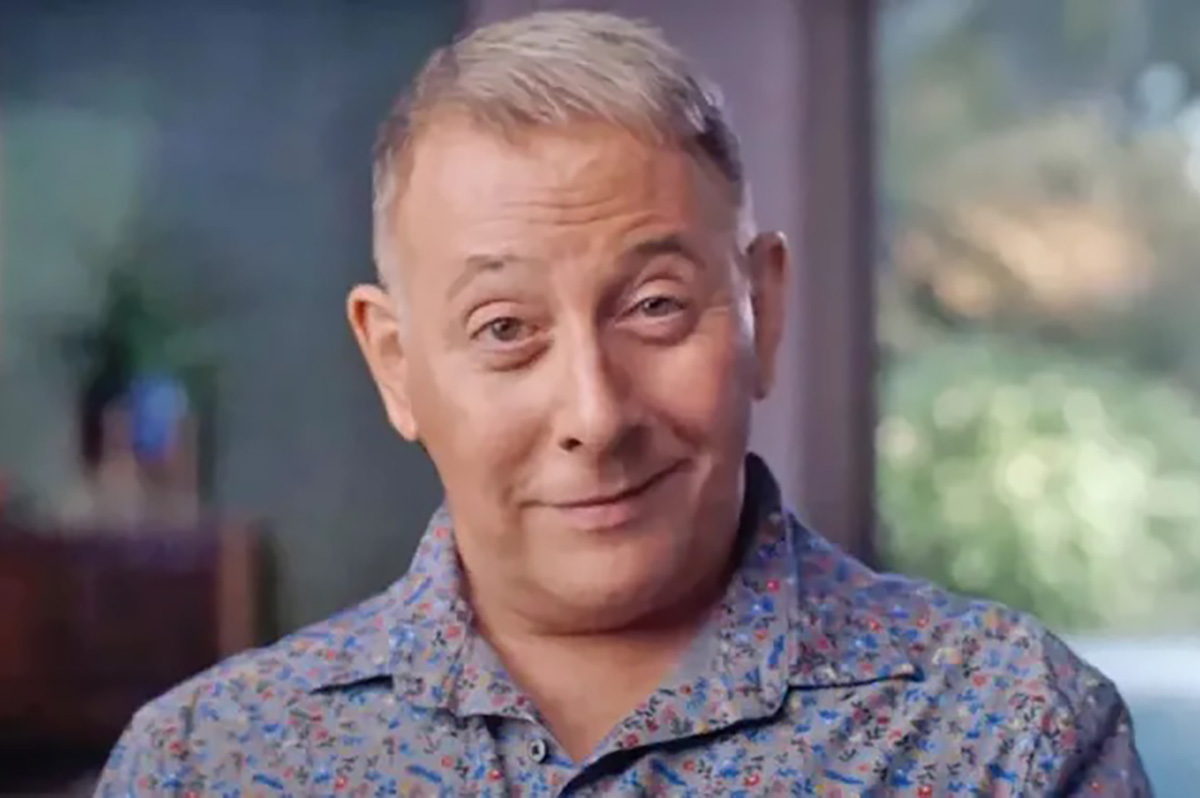
While Paul Reubens never publicly came out as gay before passing away in 2023, the two-part documentary “Pee-wee as Himself” premiered back in May on HBO Max, giving the legendary comedian a chance to posthumously open up to the world. Directed by Matt Wolf, the documentary explores how Reubens found his alter ego Pee-Wee Herman and why he kept his private life private.
The documentary won an Emmy in the Outstanding Documentary or Nonfiction Special category and remains one of the most critically acclaimed titles of the year with a 100% Rotten Tomatoes score. Also worth noting, the National Geographic documentary Sally told the posthumous coming out story of Sally Ride through the help of her long-time partner, Tam O’Shaughnessy.
5. Lady Gaga releases ‘Mayhem’
Lady Gaga entered a new phase of her musical career with the release of Mayhem, her seventh album to date. From the frenzy-inducing pop hit Abracadabra to the memorable Bruno Mars duet featured on “Die With a Smile,” seeing Gaga return to her roots and make an album for the most die-hard of fans was especially rewarding after the underwhelming film releases of “House of Gucci” and “Joker: Folie à Deux.” Gaga has been touring with The Mayhem Ball since July, her first arena tour since 2018. She even extended her tour into 2026 with more North American dates, so the party isn’t stopping anytime soon. And Gaga is even set to make an appearance next May in “The Devil Wears Prada 2.”
4. Cynthia Erivo, Ariana Grande perform at the Oscars
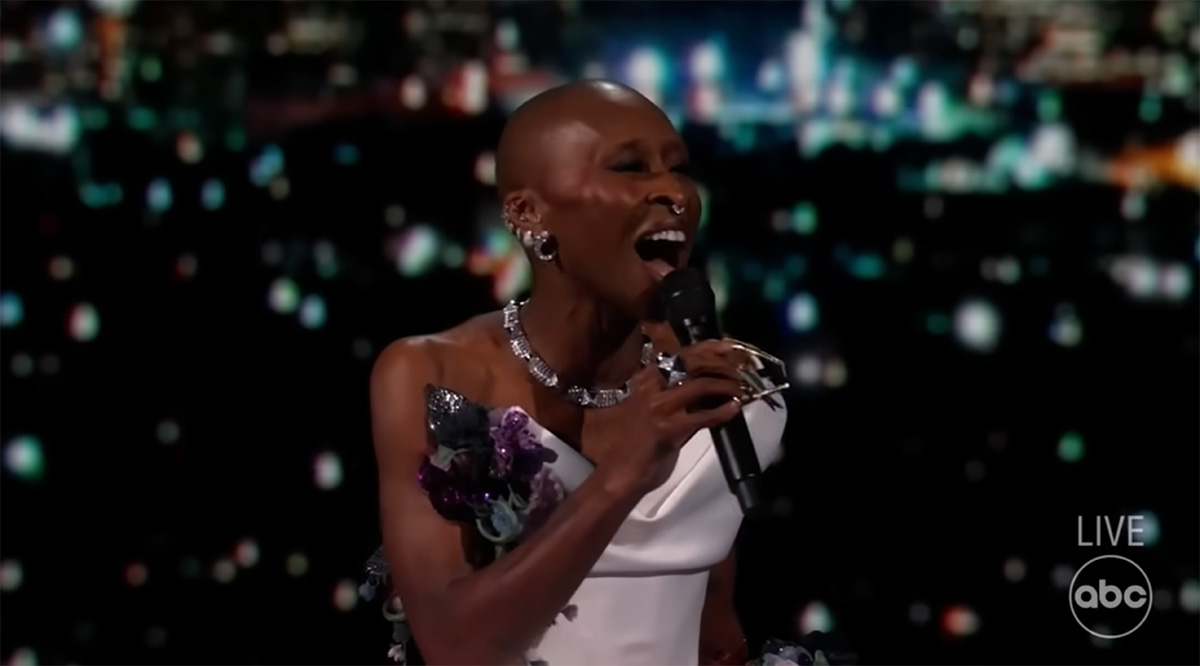
While “Wicked: For Good” didn’t quite reach the heights of the first film, we will forever have Cynthia Erivo and Ariana Grande’s breathtaking live performance that opened the 97th Academy Awards. The pair sang a rendition of “Over the Rainbow,” “Home,” and “Defying Gravity,” paying proper homage to the original 1939 “Wizard of Oz.” Even non-Wicked fans can’t deny how magical and brilliantly staged this performance was. With both Erivo and Grande up for acting Oscars last year, they’re hoping to repeat success and make history with consecutive nominations. Either way, let’s hope there’s another live performance in the making, especially with two new original songs (The Girl in the Bubble and No Place Like Home) in the mix.
3. Indya Moore speaks out against Ryan Murphy
Indya Moore has consistently used social media as a platform for activism, and in September, posted a 30-minute Instagram live speaking out against “Pose” co-creator Ryan Murphy. Moore claimed that Murphy wasn’t being a true activist for trans people. “Ryan Murphy, we need you to do more. You need to address the racism, the violence, and the targeting of people on your productions, Ryan Murphy. You do need to make sure trans people are paid equally. Yes, Janet did the right thing,” Moore said. Murphy was also back in the headlines this year for the critically panned “All’s Fair” and the controversial “Monster: The Ed Gein Story” starring Laurie Metcalf and Charlie Hunnam.
2. Cole Escola wins Tony for Best Leading Actor
Few pop culture moments this year brought us together more than Cole Escola winning a Tony award for “Oh, Mary!” the Broadway show they created, wrote and starred in (we love a triple threat!) Escola made history by becoming the first nonbinary person to win a Tony in the leading actor category, and seeing them excitedly rush to the stage wearing a Bernadette Peters-inspired gown instantly became a viral social media moment.
The cherry on top of Escola’s major moment is the recent news that they are writing a Miss Piggy movie with Jennifer Lawrence and Emma Stone producing — news that also broke the internet for the better. We cannot wait!
1. Jonathan Bailey makes gay history as ‘Sexiest Man Alive’
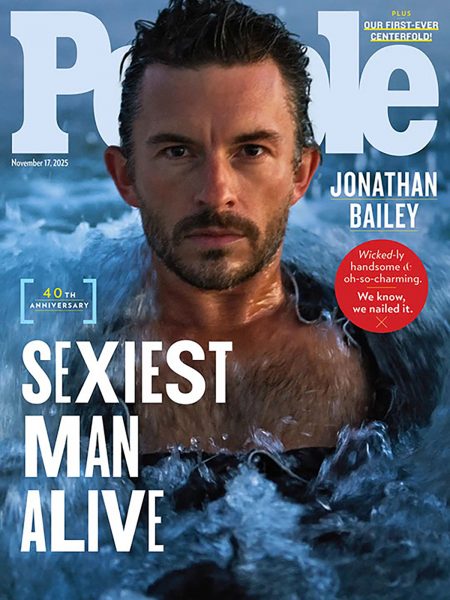
The same year as his on-screen roles in blockbusters “Jurassic World Rebirth” and “Wicked: For Good,” Jonathan Bailey made history as the first openly gay man to be named People magazine’s “Sexiest Man Alive.” The fact that it took 40 years for an openly gay man to earn the title is a signifier of how far we still have to go with queer representation, and seeing Bailey celebrated is just one small step in the right direction.
“There’s so many people that want to do brilliant stuff who feel like they can’t,” he told PEOPLE, “and I know the LGBT sector is under immense threat at the moment. So it’s been amazing to meet people who have the expertise and see potential that I could have only dreamed of.” In 2024, Bailey founded the charity titled The Shameless Fund, which raises money for LGBTQ+ organizations.
a&e features
Your guide to D.C.’s queer New Year’s Eve parties
Ring in 2026 with drag, leather, Champagne, and more
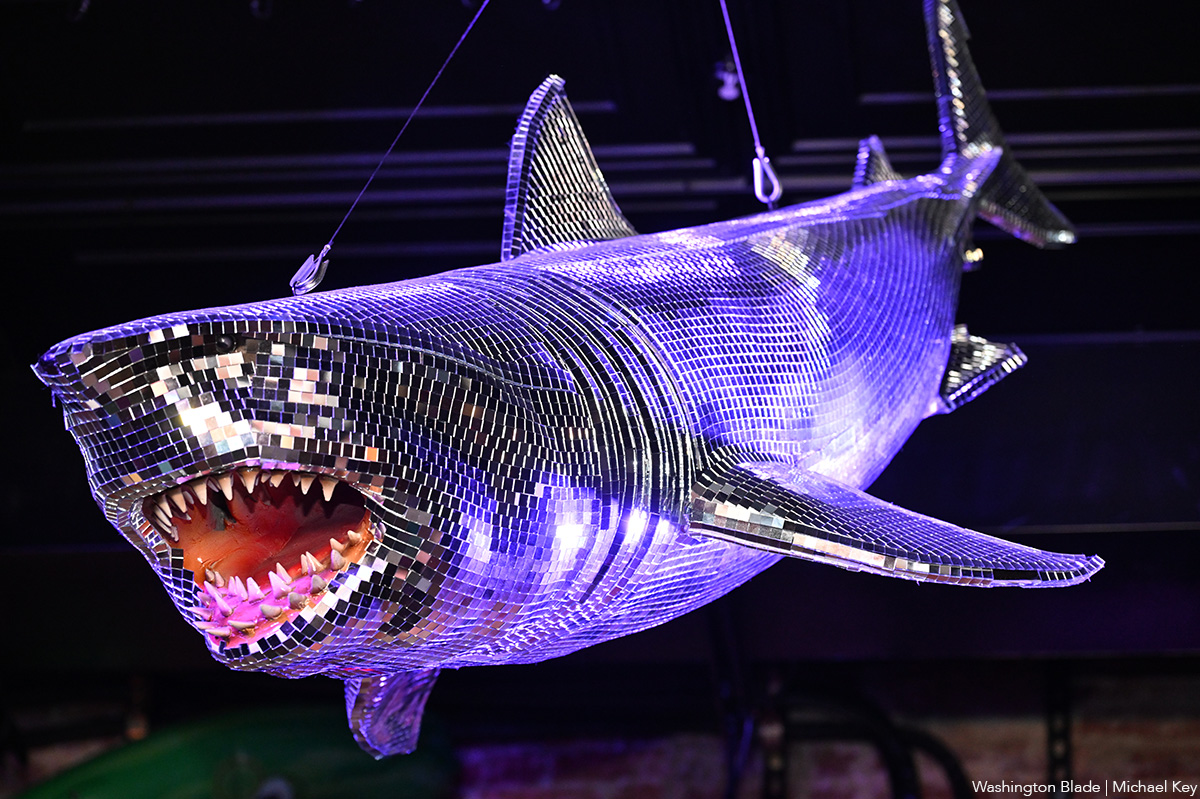
With Christmas in the rear view mirror, we can turn our attention to ringing in a much-anticipated New Year with a slew of local LGBTQ parties. Here’s what’s on tap.
Pitchers
This spacious Adams Morgan bar is hosting the “Pitchers’ Perfect New Year’s Eve.” There will be a midnight Champagne toast, the ball drop on the big screens, and no cover, all night long. The bar doesn’t close until 4 a.m., and the kitchen will be open late (though not until close). All five floors will be open for the party, and party favors are promised.
Trade
D.C.’s hottest bar/club combo is leaning into the Shark motif with its NYE party, “Feeding Frenzy.” The party is a “glitterati-infused Naughty-cal New Year’s Even in the Shark Tank, where the boats are churning and the sharks are circling.” Trade also boasts no cover charge, with doors opening at 5 p.m. and the aforementioned Shark Tank opening at 9 p.m.. Four DJs will be spread across the two spaces; midnight hostess is played by Vagenesis and the two sea sirens sensuously calling are Anathema and Justin Williams.
Number Nine
While Trade will have two DJs as part of one party, Number Nine will host two separate parties, one on each floor. The first floor is classic Number Nine, a more casual-style event with the countdown on TVs and a Champagne midnight toast. There will be no cover and doors open at 5 p.m. Upstairs will be hosted by Capital Sapphics for its second annual NYE gathering. Tickets (about $50) include a midnight Champagne toast, curated drink menu, sapphic DJ set by Rijak, and tarot readings by Yooji.
Crush
Crush will kick off NYE with a free drag bingo at 8 p.m. for the early birds. Post-bingo, there will be a cover for the rest of the evening, featuring two DJs. The cover ($20 limited pre-sale that includes line skip until 11 p.m.; $25 at the door after 9 p.m.) includes one free N/A or Crush, a Champagne toast, and party favors (“the legal kind”). More details on Eventbrite.
Bunker
This subterranean lair is hosting a NYE party entitled “Frosted & Fur: Aspen After Dark New Year’s Eve Celebration.” Arriety from Rupaul Season 15 is set to host, with International DJ Alex Lo. Doors open at 9 p.m. and close at 3 p.m.; there is a midnight Champagne toast. Cover is $25, plus an optional $99 all-you-can-drink package.
District Eagle
This leather-focused bar is hosting “Bulge” for its NYE party. Each District Eagle floor will have its own music and vibe. Doors run from 7 p.m.-3 a.m. and cover is $15. There will be a Champagne toast at midnight, as well as drink specials during the event.
Kiki, Shakiki
Kiki and its new sister bar program Shakiki (in the old Shakers space) will have the same type of party on New Year’s Eve. Both bars open their doors at 5 p.m. and stay open until closing time. Both will offer a Champagne toast at midnight. At Kiki, DJ Vodkatrina will play; at Shakiki, it’ll be DJ Alex Love. Kiki keeps the party going on New Year’s Day, opening at 2 p.m., to celebrate Kiki’s fourth anniversary. There will be a drag show at 6 p.m. and an early 2000s dance party 4-8 p.m.
Spark
This bar and its new menu of alcoholic and twin N/A drinks will host a NYE party with music by DJ Emerald Fox. Given this menu, there will be a complimentary toast at midnight, guests can choose either sparkling wine with or without alcohol. No cover, but Spark is also offering optional wristbands at the door for $35 open bar 11 p.m.-1 a.m. (mid-shelf liquor & all NA drinks).
-

 Sponsored4 days ago
Sponsored4 days agoSafer Ways to Pay for Online Performances and Queer Events
-

 District of Columbia3 days ago
District of Columbia3 days agoTwo pioneering gay journalists to speak at Thursday event
-

 Colombia3 days ago
Colombia3 days agoBlade travels to Colombia after U.S. forces seize Maduro in Venezuela
-

 a&e features3 days ago
a&e features3 days agoQueer highlights of the 2026 Critics Choice Awards: Aunt Gladys, that ‘Heated Rivalry’ shoutout and more



















